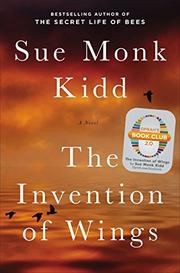


THE INVENTION OF WINGS
by Sue Monk Kidd
Kidd (The Mermaid Chair, 2005, etc.) hits her stride and avoids sentimental revisionism with this historical novel about the relationship between a slave and the daughter of slave owners in antebellum Charleston.
Sarah Grimké was an actual early abolitionist and feminist whose upbringing in a slaveholding Southern family made her voice particularly controversial. Kidd re-imagines Sarah’s life in tandem with that of a slave in the Grimké household. In 1803, 11-year-old Sarah receives a slave as her birthday present from her wealthy Charleston parents. Called Hetty by the whites, Handful is just what her name implies—sharp tongued and spirited. Precocious Sarah is horrified at the idea of owning a slave but is given no choice by her mother, a conventional Southern woman of her time who is not evil but accepts slavery (and the dehumanizing cruelties that go along with it) as a God-given right. Soon, Sarah and Handful have established a bond built on affection and guilt. Sarah breaks the law by secretly teaching Handful to read and write. When they are caught, Handful receives a lashing, while Sarah is banned from her father’s library and all the books therein, her dream of becoming a lawyer dashed. As Sarah and Handful mature, their lives take separate courses. While Handful is physically imprisoned, she maintains her independent spirit, while Sarah has difficulty living her abstract values in her actual life. Eventually, she escapes to Philadelphia and becomes a Quaker, until the Quakers prove too conservative. As Sarah’s activism gives her new freedom, Handful’s life only becomes harder in the Grimké household. Through her mother, Handful gets to know Denmark Vesey, who dies as a martyr after attempting to organize a slave uprising. Sarah visits less and less often, but the bond between the two women continues until it is tested one last time.
Kidd’s portrait of white slave-owning Southerners is all the more harrowing for showing them as morally complicated, while she gives Handful the dignity of being not simply a victim, but a strong, imperfect woman.